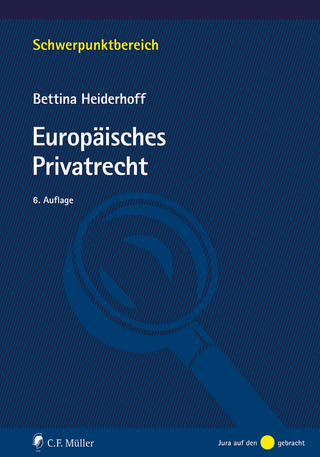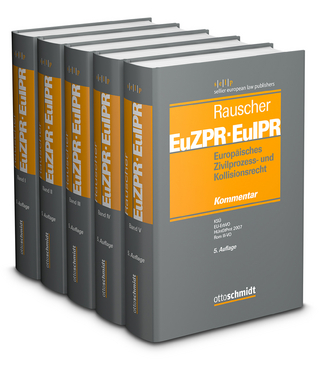
Philosophical Foundations of Private International Law
Oxford University Press (Verlag)
978-0-19-285877-1 (ISBN)
Private international law has long been understood as a doctrinal and technical body of law, without interesting theoretical foundations or implications. By systematically exploring the rich array of philosophical topics that are part of the fabric of private international law, Philosophical Foundations of Private International Law fills a significant and long-standing void in the legal and philosophical literature.
The contributions to this volume are testimony to the significant potential for interaction between philosophy and private international law. Some aim to expand and rethink classical jurisprudential theories by focusing on law beyond the state and on the recognition of foreign law and judgments in domestic courts. Others bring legal and moral theories to bear on traditional debates in private international law, such as legal pluralism, transnational justice, the interpretation of foreign legal policies, and the boundaries of the legal system. Several engage with the history of both private international law and legal and political philosophy. They point to missed opportunities when philosophers ignored law's transnational dimensions, or when private international law scholars failed to position their theories within broader philosophical schools of thought. Some seek to complete past attempts to articulate the philosophical dimensions of private international law that were never carried through. Thought-provoking and topical, this volume displays the varied themes cutting through the disciplines of private international law and philosophy.
Roxana Banu is an associate professor of law at Oxford University and a fellow and tutor in law at Lady Margaret Hall. Previously, she was a lecturer in law at Queen Mary University and an assistant professor at Western Ontario University Faculty of Law. She obtained her SJD degree from the University of Toronto Faculty of Law and her LL.M. magna cum laudae from Fordham Law School. Her research interests lie in private international law, legal history and theory, and feminist theory. She is currently researching on private international law's colonial history and on the social and gender history of cross-border maintenance conventions in the interwar period. Michael S. Green is the Woodbridge Professor of Law at William & Mary Law School. He holds a Ph.D. in Philosophy from Yale University and a J.D. from Yale Law School. Previously, he was a professor of law at George Mason Law School and an assistant professor of philosophy at Tufts University. He clerked for Judge Richard A. Posner on the U.S. Court of Appeals for the Seventh Circuit. His research interests are in the philosophy of law, civil procedure, the conflict of laws, constitutional law, and continental philosophy (especially Nietzsche and Neo-Kantianism). Ralf Michaels is Director of the Max Planck Institute for Comparative and International Private Law in Hamburg, Germany, Chair in Global Law at Queen Mary University in London, and Professor of Law at Hamburg University. Michaels holds an LL.M. from Cambridge University and a PhD in Law from Passau University. His current research focuses on decolonial comparative law, regulatory conflict of laws, and theoretical foundations of private international law and global legal plurality. Michaels is a titular member of the Academia Europaea, the American Law Institute, the International Association of Comparative Law, and the Comparative Law Associations of the United States, Germany, and France.
Roxana Banu, Michael S. Green, Ralph Michaels: Introduction
Part I Normative Structure
1: Florian Roedl: Necessary Unity
2: Sagi Peari: The Choice-Equality Foundation of Choice of Law: The Restatement
3: David Dyzenhaus: Not an Isolated, Exceptional, and Indeed Contradictory Branch of Jurisprudence
4: Kermit Roosevelt III: Against Choice of Law Exceptionalism
5: Giovanni Sartor, Antonino Rotolo: Logical Models for Private International Law
Part II Authority
6: Michael S. Green: Authority and Interest Analysis
7: Lea Brilmayer: Three Ethical Perspectives in American Choice of Law
8: Alex Mills: Justifying and Challenging Territoriality in Private International Law
9: Joanna Langille: Public Policy and the Rule of Law
Part III Plurality
10: Nicole Roughan: Plurality of Laws and Conflict of Laws: Reconciling Through Recognition?
11: Hans Lindahl: Conflict of Laws: Asymmetrical Recognition of the Stranger (in Ourselves)
12: Ralf Michaels: Private International Law and the Legal Pluriverse
13: Horatia Muir Watt: Private International Law as 'Ligature': Elements for a Post-Monist Jurisprudence
Part IV Justice and Autonomy
14: Alejandro Aldo Menicocci: The Justice of Private International Law: Equality and the Difference Principle
15: What Do We Owe to Each Other in Private International Law?: Moral Contractualism and Transnational Justice Roxana Banu
16: A Relations-First Approach to Choice of Law Toni Marzal, George Pavlakos
17: Party Autonomy and the Challenge of Choice of Law Perry Dane
18: Conflict of Laws and Global Governance Dai Yokomizo
| Erscheinungsdatum | 22.08.2024 |
|---|---|
| Reihe/Serie | Philosophical Foundations of Law |
| Verlagsort | Oxford |
| Sprache | englisch |
| Maße | 175 x 250 mm |
| Gewicht | 922 g |
| Themenwelt | Recht / Steuern ► Allgemeines / Lexika |
| Recht / Steuern ► EU / Internationales Recht | |
| Recht / Steuern ► Privatrecht / Bürgerliches Recht ► Internationales Privatrecht | |
| ISBN-10 | 0-19-285877-7 / 0192858777 |
| ISBN-13 | 978-0-19-285877-1 / 9780192858771 |
| Zustand | Neuware |
| Informationen gemäß Produktsicherheitsverordnung (GPSR) | |
| Haben Sie eine Frage zum Produkt? |
aus dem Bereich


